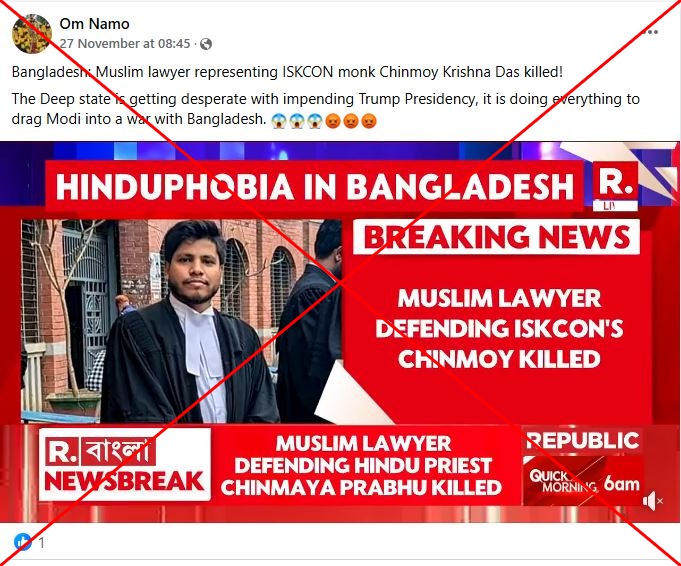In November 2024, tensions flared in Chittagong, Bangladesh, following the arrest of a Hindu monk, Chinmoy Krishna Das Brahmachari, who had been advocating for the rights and protection of the Hindu minority in the predominantly Muslim nation. The monk was initially detained on charges related to disrespecting the national flag during a protest rally, and his subsequent denial of bail sparked violent clashes between his supporters and police. Tragically, amidst the turmoil, a Muslim public prosecutor named Saiful Islam Alif was killed, causing significant unrest. However, various media outlets, particularly those in India, mistakenly reported that Alif had been representing the monk in the legal proceedings, contributing to the rapid spread of misinformation regarding the incident.
The situation was exacerbated by reports from Indian media and social media platforms that fabricated connections linking the prosecutor to the monk’s case. Prominent news channels and social media posts claimed that Alif was part of the legal team defending Brahmachari, suggesting a potential conspiracy aimed at igniting sectarian conflict between Bangladesh and India. This narrative gained traction, despite no substantial evidence to support the allegations. The claims were further fueled by a post on Facebook that claimed the death was part of a “deep state” plot, aiming to raise tensions between the two neighboring countries, reflective of the underlying suspicions surrounding religious and political dynamics in the region.
In a bid to clarify the situation, the Chittagong District Bar Association strongly refuted these claims, asserting that Saiful Islam Alif was neither representing Brahmachari nor part of the prosecution. The association’s president, Nazimuddin Chowdhury, emphasized that Alif was killed by a violent mob while returning home, and he was not involved in the ongoing case of the Hindu monk. This statement aimed to dismantle the misinformation being circulated and restore the integrity of the legal proceedings in Bangladesh.
Adding to the official clarification, the Bangladeshi interim government, headed by Nobel laureate Muhammad Yunus, issued a public statement denying the accusations linking Alif to the monk’s legal representation. The government emphasized that the facts surrounding the case had been misrepresented and that the claims were spread with malicious intent. They provided evidence in the form of the bail application of Brahmachari, which indicated that his legal representative was Subasish Sharma, further distancing Alif from the case. Their swift response illustrated the country’s concern over potential unrest resulting from these manipulated narratives.
Despite the tumultuous backdrop of religious and political tension in Bangladesh, the incident drew attention to the complexities surrounding the representation of religious communities in a country where such identities often intersect with politics. The protests led by Brahmachari indicated the rising tensions faced by the Hindu minority in Bangladesh, which has a history of marginalization in a predominantly Muslim society. His call for protection highlighted the necessity of addressing the religious disparities and safeguarding the rights of minority communities within a diverse nation.
As journalists and media outlets grappled with the fallout of the chaos in Chittagong, it became evident that misinformation could exacerbate tensions and lead to dire consequences. The widespread misreporting surrounding Alif’s death underscored the need for responsible journalism, particularly in regions with delicate social fabric. With political turbulence on the rise, narratives that inaccurately depict religious relations pose risks, potentially inflaming sectarian sentiments. As Bangladesh continues to navigate its political landscape, the importance of accurate representation of events remains crucial to maintaining peace among its diverse populations.

